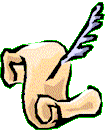Rare Dog
Crossbreeds
Pointer + Setter = Poinsetter: a traditional Christmas
pet
Kerry Blue Terrier + Skye Terrier = Blue Skye: a dog for visionaries
Great Pyrenees + Dachshund = Pyradachs: a puzzling breed
Pekingnese + Lhasa Apso = Peekasso: an abstract dog
Irish Water Spaniel + English Springer Spaniel = Irish
Springer: a dog fresh and clean as a whistle
Labrador Retriever + Curly Coated Retriever = Lab Coat Retriever: the choice of research
scientists
Newfoundland + Basset Hound = Newfound Asset Hound: a dog for financial advisors
Terrier + Bulldog = Terribull: a dog that makes awful mistakes
Bloodhound + Labrador = Blabador: a dog that barks incessantly
Malamute + Pointer = Moot Point: a dog that....oh, well, it doesn't matter anyway
Collie + Malamute = Commute: a dog that travels to work
Deerhound + Terrier = Derriere: a dog that's true to the end
Opportunity
This country is so full of opportunity. Where else can
a wife hire a woman to do her housework so she can volunteer at the day care center where
the cleaning woman leaves her child.
ZONDERVAN Time To Smile
Enjoyed the
Sermon
One Sunday morning, after attending church services in Hartford,
Connecticut, Mark Twain said to Dr. Doane, the minister: "I enjoyed your services
this morning, doctor. I welcomed it like an old friend. I have, you know, a book at home
containing every word of it."
"You have not," said the indignant Dr. Doane.
"I have so," countered Twain.
"Then send it to me. I'd very much like to see it."
"I'll send it," promised Mark and the following day he
sent the Reverend Dr. Doane an unabridged dictionary.
The Field Trip
While waiting to board a plane in a small
airport, the ticket agent made the following announcement on the paging system:
"Would the person who dropped his pants please return to the ticket counter."
After a slight pause, the same voice added, "The pants were on a hanger!
ZONDERVAN Time To Smile
KEEP IT
Once there was a millionaire, who collected
live alligators. He kept them in the pool in back of his mansion. The millionaire also had
a beautiful daughter who was single. One day he decides to throw a huge party, and during
the party he announces, "My dear guests...I have a proposition to every man here. I
will give one million dollars or my daughter to the man who can swim across this pool full
of alligators and emerge unharmed!"
As soon as he finished his last word, there was the sound of a large SPLASH!! There was
one guy in the pool swimming with all he could...the crowd cheered him on as he kept
stroking. Finally, he made it to the other side unharmed. The millionaire was impressed.
He said, "My boy that was incredible! Fantastic! I didn't think it could be done!
Well I must keep my end of the bargain...which do you want, my daughter or the one million
dollars?"
The guy says, "Listen, I don't want your money! And I don't want your daughter! I
want the person who pushed me in that WATER!!!."
Source: David A. Rinke
II / Funny Pages Mailing List
Cured :
A man goes into a drug store and asks the
pharmacist if he can give him something for the hiccups. The pharmacist promptly reaches
out and slaps the mans face. (Whack)
"What did you do that for?" the man asks.
"Well, you don't have the hiccups anymore do you?"
The man says, "No, but my wife out in the car still does!"
Source: Speaker's
Encyclopedia





 Today's Word –
HERESY
Today's Word –
HERESY



